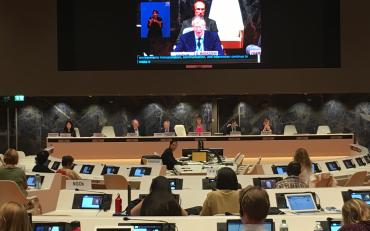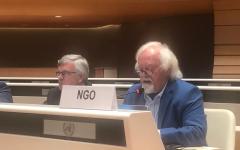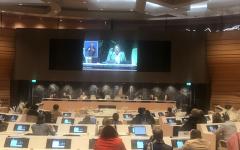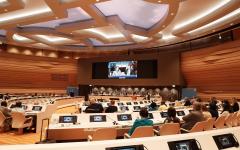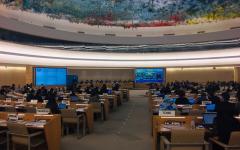On 25 August 2017, the CRPD Committee held the Day of General Discussion (DGD) on the Right to Equality and Non-discrimination (Article 5) in the lead up to the development of a general comment. This event was organised with the support by the German Permanent Mission to the UN, the CRPD Committee Secretariat and the International Disability Alliance. The DGD gathered CRPD Committee members, Representative from States, National Human Rights Institutions, civil society organisations, including organisations of persons with disabilities, and academia, to discuss on key issues under Article 5, which will hopefully contribute to the work of the CRPD Committee.
The DGD had opening remarks by OHCHR officials, the Chair of the Kenyan National Commission on Human Rights and the Chair of the CRPD Committee Member, Ms Theresia Degener. Following the opening, the DGD session was structured in 3 panels on 1) Disability–Based Discrimination and Intersectionality, 2) Justiciability and Enforcement of Equality and Non-Discrimination in the context of disability and 3) Distinguishing Reasonable Accommodation, Special Measures and Obligations under Accessibility.
Among other things, many participants highlighted the importance of addressing different forms of discrimination, including intersectional discrimination, and different common confusions of different concepts such as limiting reasonable accommodation to issues of accessibility, or confusing it with specific measures. Disaggregated data by age, sex, impairment, but also by ethnic background, socio-economical condition, among others, was noted as being key for identification of situations of structural discrimination.
Silvia Quan, IDA's Senior Adviser on Human Rights, provided closing remarks of the Day of General Discussion. She highlighted the need that the Committee formally adopts the language of “transformative equality,” as this is the notion that better reflects the paradigm shift and the obligations brought by the CRPD. She also stressed on the need that a general comment on Article 5 highlights from the outset the States duty to closely consult and actively involve organisations of persons with disabilities in the design, implementation and evaluation of legislations and policies.
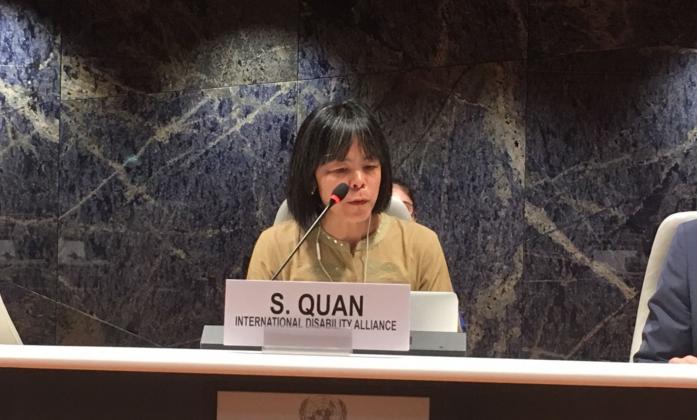
Silvia Quan also called for covering all kinds of discrimination, including denial of reasonable accommodation and discrimination by association, and highlighted the need to pay special attention to marginalised groups, including among persons with disabilities, such as persons with intellectual, psychosocial and/or multiple disabilities, women, girls and boys with disabilities, and persons with disabilities with diverse gender identity and sexual orientation. In particular, the CRPD Committee should make absolutely clear that reasonable accommodation is of immediate application, provide concrete and detailed guidance to States for them to ensure provision of reasonable accommodation in connection with all rights and distinguish this obligations from related concepts such as accessibility, specific measures, procedural accommodation, etc.. In particular, the issue of whether reasonable accommodation is also due to associates to persons with disabilities should be addressed. See also IDA´s submission for this DGD.
FRA, GANHRI and IDA side event during the Day of General Discussion
FRA, GANHRI and IDA, with the sponsorship of the OHCHR and the Permanent Missions of Mexico and New Zealand, co-hosted a side event during the CRPD Committee Day of General Discussion on Article 5 of the Convention on the Rights of Persons with Disabilities. The side event focused on the key roles of organisations of persons with disabilities and national human rights institutions in “SDGs-CRPD implementation and monitoring”. It has been webcasted and remote sign language interpretation and captioning have been provided.
Panellists highlighted the need to ensure support, including technical support, to organisations of persons with disabilities to enable them to appropriately involve in legislation and policy decision making processes, in particular to ensure a thorough understanding of the CRPD provisions. Furthermore, it was highlighted that national human rights institutions have a key role to play for monitoring CRPD implementation, including through the use of human rights indicators. A common concern was the pressing need for States to collect disaggregated information on persons with disabilities, notably by employing the Washington Group Set of Questions in next national censuses.
